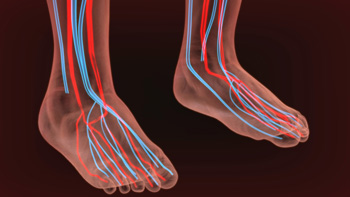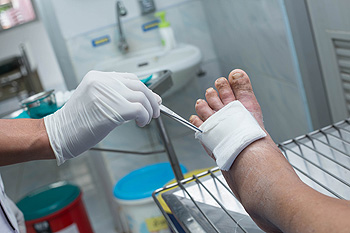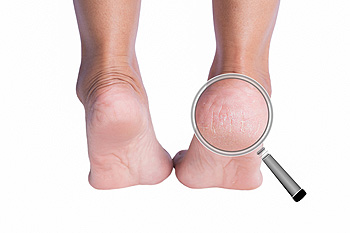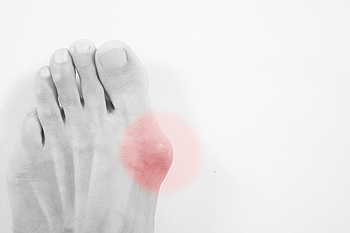Items filtered by date: June 2020
Airplane Travel and Poor Circulation
 People who travel on airplanes may experience poor circulation in their feet. This can occur from a lack of adequate leg room, in addition to limited mobility. Noticeable symptoms of this condition can include cramped and swollen feet which can cause severe pain and discomfort. It is important to take precautions while preparing for a long flight. These can consist of wearing loose clothing, drinking plenty of water, and avoiding caffeine. Research has indicated that it may be beneficial to take vitamin C & E supplements, as this may help to improve circulation. If you would like additional information about how poor circulation affects the feet, it is suggested that you consult with a podiatrist.
People who travel on airplanes may experience poor circulation in their feet. This can occur from a lack of adequate leg room, in addition to limited mobility. Noticeable symptoms of this condition can include cramped and swollen feet which can cause severe pain and discomfort. It is important to take precautions while preparing for a long flight. These can consist of wearing loose clothing, drinking plenty of water, and avoiding caffeine. Research has indicated that it may be beneficial to take vitamin C & E supplements, as this may help to improve circulation. If you would like additional information about how poor circulation affects the feet, it is suggested that you consult with a podiatrist.
Poor circulation is a serious condition and needs immediate medical attention. If you have any concerns with poor circulation in your feet contact Dr. Ronald Sheppard of Warren-Watchung Podiatry Center. Our doctor will treat your foot and ankle needs.
Poor Circulation in the Feet
Poor blood circulation in the feet and legs is can be caused by peripheral artery disease (PAD), which is the result of a buildup of plaque in the arteries.
Plaque buildup or atherosclerosis results from excess calcium and cholesterol in the bloodstream. This can restrict the amount of blood which can flow through the arteries. Poor blood circulation in the feet and legs are sometimes caused by inflammation in the blood vessels, known as vasculitis.
Causes
Lack of oxygen and oxygen from poor blood circulation restricts muscle growth and development. It can also cause:
- Muscle pain, stiffness, or weakness
- Numbness or cramping in the legs
- Skin discoloration
- Slower nail & hair growth
- Erectile dysfunction
Those who have diabetes or smoke are at greatest risk for poor circulation, as are those who are over 50. If you have poor circulation in the feet and legs it may be caused by PAD and is important to make changes to your lifestyle in order to reduce risk of getting a heart attack or stroke. Exercise and maintaining a healthy lifestyle will dramatically improve conditions.
As always, see a podiatrist as he or she will assist in finding a regimen that suits you. A podiatrist can also prescribe you any needed medication.
If you have any questions please feel free to contact one of our offices located in Marlboro and Watchung, NJ . We offer the newest diagnostic and treatment technologies for all your foot and ankle needs.
Edema Is Common During Pregnancy
Many women may experience difficulty wearing shoes as their pregnancy progresses. This can be a result of swollen feet, which can cause discomfort. Swelling, or edema, is considered to be a normal part of pregnancy, and there are methods that can be implemented which can help to manage the swelling. These can consist of elevating the feet as often as possible during the day, and controlling the amount of salt that is ingested. It may also help to drink plenty of fresh water, in addition to refraining from sitting for long periods at a time. It is important for the feet to maintain proper hygiene during pregnancy, and it is suggested that you consult with a podiatrist who can guide you toward proper foot care.
Pregnant women with swollen feet can be treated with a variety of different methods that are readily available. For more information about other cures for swollen feet during pregnancy, consult with Dr. Ronald Sheppard from Warren-Watchung Podiatry Center. Our doctor will attend to all of your foot and ankle needs.
What Foot Problems Can Arise During Pregnancy?
One problem that can occur is overpronation, which occurs when the arch of the foot flattens and tends to roll inward. This can cause pain and discomfort in your heels while you’re walking or even just standing up, trying to support your baby.
Another problem is edema, or swelling in the extremities. This often affects the feet during pregnancy but tends to occur in the later stages.
How Can I Keep My Feet Healthy During Pregnancy?
- Wearing orthotics can provide extra support for the feet and help distribute weight evenly
- Minimize the amount of time spent walking barefoot
- Wear shoes with good arch support
- Wear shoes that allow for good circulation to the feet
- Elevate feet if you experience swelling
- Massage your feet
- Get regular, light exercise, such as walking, to promote blood circulation to the feet
If you have any questions please feel free to contact one of our offices located in Marlboro and Watchung, NJ . We offer the newest diagnostic and treatment technologies for all your foot and ankle needs.
Diabetes and Foot Wounds
 Diabetes is a common ailment among many patients. If there is a wound on the foot, it is suggested that correct treatment begins as quickly as possible in order to help prevent foot ulcers from developing. This painful condition may occur as a result of neuropathy, which can cause the inability to feel if there are existing cuts, scrapes or bruises on the feet. Diabetic patients are urged to take proper care of their feet. This can consist of washing and drying the feet thoroughly, and it can be beneficial to apply a good moisturizer. Additionally, it is important to trim the toenails correctly, and wear shoes that fit properly. If you have diabetes, it is strongly advised that you are under the care of a podiatrist who can offer management techniques that are right for you.
Diabetes is a common ailment among many patients. If there is a wound on the foot, it is suggested that correct treatment begins as quickly as possible in order to help prevent foot ulcers from developing. This painful condition may occur as a result of neuropathy, which can cause the inability to feel if there are existing cuts, scrapes or bruises on the feet. Diabetic patients are urged to take proper care of their feet. This can consist of washing and drying the feet thoroughly, and it can be beneficial to apply a good moisturizer. Additionally, it is important to trim the toenails correctly, and wear shoes that fit properly. If you have diabetes, it is strongly advised that you are under the care of a podiatrist who can offer management techniques that are right for you.
Diabetic foot care is important in preventing foot ailments such as ulcers. If you are suffering from diabetes or have any other concerns about your feet, contact Dr. Ronald Sheppard from Warren-Watchung Podiatry Center. Our doctor can provide the care you need to keep you pain-free and on your feet.
Diabetic Foot Care
Diabetes affects millions of people every year. The condition can damage blood vessels in many parts of the body, especially the feet. Because of this, taking care of your feet is essential if you have diabetes, and having a podiatrist help monitor your foot health is highly recommended.
The Importance of Caring for Your Feet
- Routinely inspect your feet for bruises or sores.
- Wear socks that fit your feet comfortably.
- Wear comfortable shoes that provide adequate support.
Patients with diabetes should have their doctor monitor their blood levels, as blood sugar levels play such a huge role in diabetic care. Monitoring these levels on a regular basis is highly advised.
It is always best to inform your healthcare professional of any concerns you may have regarding your feet, especially for diabetic patients. Early treatment and routine foot examinations are keys to maintaining proper health, especially because severe complications can arise if proper treatment is not applied.
If you have any questions please feel free to contact one of our offices located in Marlboro and Watchung, NJ . We offer the newest diagnostic and treatment technologies for all your foot and ankle needs.
The Causes and Risks of Cracked Heels
 Cracked heels, although not usually serious, can cause discomfort and may be unsightly to look at as well. Cracked heels can be caused by standing for long periods of time, especially barefoot, from using harsh soaps, and wearing ill-fitting shoes. Most cracked heels can be treated with heel balms, exfoliation, or liquid bandages. However, cracked heels can also indicate more serious medical conditions such as a vitamin deficiency, fungal infection, obesity, psoriasis, or hypothyroidism. In these instances, or instances of severe cracks, care from a podiatrist may be necessary. A podiatrist can provide proper care and medication that may be needed.
Cracked heels, although not usually serious, can cause discomfort and may be unsightly to look at as well. Cracked heels can be caused by standing for long periods of time, especially barefoot, from using harsh soaps, and wearing ill-fitting shoes. Most cracked heels can be treated with heel balms, exfoliation, or liquid bandages. However, cracked heels can also indicate more serious medical conditions such as a vitamin deficiency, fungal infection, obesity, psoriasis, or hypothyroidism. In these instances, or instances of severe cracks, care from a podiatrist may be necessary. A podiatrist can provide proper care and medication that may be needed.
If the skin on your feet starts to crack, you may want to see a podiatrist to find treatment. If you have any concerns, contact Dr. Ronald Sheppard from Warren-Watchung Podiatry Center. Our doctor can provide the care you need to keep you pain-free and on your feet.
Cracked Heels
It is important to moisturize your cracked heels in order to prevent pain, bleeding, and infection. The reason cracked heels form is because the skin on the foot is too dry to support the immense pressure placed on them. When the foot expands, the dry skin on the foot begins to split.
Ways to Help Heal Them
- Invest in a good foot cream
- Try Using Petroleum Jelly
- Ease up on Soaps
- Drink Plenty of Water
Ways to Prevent Cracked Heels
- Moisturize After Showering
- Skip a Shower
- Keep Shower Water Lukewarm
- Don’t Scrub Your Feet
If you are unsure how to proceed in treating cracked heels, seek guidance from a podiatrist. Your doctor will help you with any questions or information you may need.
If you have any questions, please feel free to contact one of our offices located in Marlboro and Watchung, NJ . We offer the newest diagnostic and treatment technologies for all your foot care needs.
Heel Pain Can Be Treated!
Possible Causes of a Bunion
 The medical condition that is referred to as a bunion is a permanent deformity of the bones in the big toe. It gradually occurs as a result of genetic factors, or from wearing shoes that do not have adequate room for the toes to move freely in. There are several symptoms that are associated with bunions. These can include corns, calluses, and blisters that can develop on top of the bunion, and the surrounding area may be red and swollen. It may help to purchase larger shoes that can accommodate the bunion, in addition to putting a protective pad over the impacted area. If you notice a developing bunion, it is strongly suggested that you consult with a podiatrist who can provide the correct treatment for you.
The medical condition that is referred to as a bunion is a permanent deformity of the bones in the big toe. It gradually occurs as a result of genetic factors, or from wearing shoes that do not have adequate room for the toes to move freely in. There are several symptoms that are associated with bunions. These can include corns, calluses, and blisters that can develop on top of the bunion, and the surrounding area may be red and swollen. It may help to purchase larger shoes that can accommodate the bunion, in addition to putting a protective pad over the impacted area. If you notice a developing bunion, it is strongly suggested that you consult with a podiatrist who can provide the correct treatment for you.
If you are suffering from bunions, contact Dr. Ronald Sheppard of Warren-Watchung Podiatry Center. Our doctor can provide the care you need to keep you pain-free and on your feet.
What Is a Bunion?
A bunion is formed of swollen tissue or an enlargement of boney growth, usually located at the base joint of the toe that connects to the foot. The swelling occurs due to the bones in the big toe shifting inward, which impacts the other toes of the foot. This causes the area around the base of the big toe to become inflamed and painful.
Why Do Bunions Form?
Genetics – Susceptibility to bunions are often hereditary
Stress on the feet – Poorly fitted and uncomfortable footwear that places stress on feet, such as heels, can worsen existing bunions
How Are Bunions Diagnosed?
Doctors often perform two tests – blood tests and x-rays – when trying to diagnose bunions, especially in the early stages of development. Blood tests help determine if the foot pain is being caused by something else, such as arthritis, while x-rays provide a clear picture of your bone structure to your doctor.
How Are Bunions Treated?
- Refrain from wearing heels or similar shoes that cause discomfort
- Select wider shoes that can provide more comfort and reduce pain
- Anti-inflammatory and pain management drugs
- Orthotics or foot inserts
- Surgery
If you have any questions, please feel free to contact one of our offices located in Marlboro and Watchung, NJ . We offer the newest diagnostic and treatment technologies for all your foot care needs.


